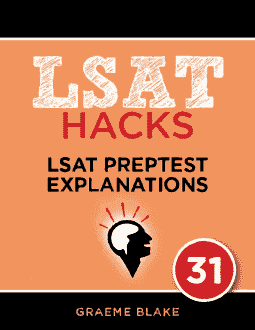DISCUSSION: It sounds like a traditional history will have a unified story (lines 33-35), and will either be a story (narrative) or an argument (causal narrative). (from lines 39-42.)
The wrong answers have one thing in common. They don’t describe history books. The passage is comparing Haraway’s work to traditional history books or scholarly articles. None of B-E even come close.
A newspaper editorial? Math notes? A transcript? A TV show? None of those sound at all like “traditional history”. …you’re allowed to use common sense.
___________
- CORRECT. This sounds like a story about science. That’s really all we’re looking for: a normal story.
- A TV series about a prediction doesn’t sound like traditional history. The passage compares Haraway’s book to other books.
- This sort of sounds like Haraway’s book. The transcript certainly doesn’t sound like a story.
- This sounds like…a newspaper article, not a historical book. If you want to study history, do you pick up the op-ed page of a newspaper?
- Mathematical notes aren’t history. They might be used as evidence when writing a traditional history, but they aren’t a history book.


Leave a Reply